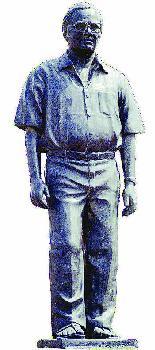దస్త్రం:Rachakonda Viswanatha sastry.jpg
Rachakonda_Viswanatha_sastry.jpg (155 × 350 పిక్సెళ్ళు, ఫైలు పరిమాణం: 14 KB, MIME రకం: image/jpeg)
This is a file from the Wikimedia Commons. Information from its description page there is shown below. Commons is a freely licensed media file repository. You can help. |
సారాంశం
| వివరణRachakonda Viswanatha sastry.jpg |
English: "The courts, the police and the laws are being increasingly used to protect the affluent making a mockery of democracy. Justice is being crushed by the greedy men in black coats and the lathis of the khakis (cops), taking advantage of the loopholes in the laws," wrote Rachakonda Viswanatha Sastry, popularly known as Raavi Sastry, a lawyer, a writer and above all, a great humanist who wanted to improve the conditions of the poor through his writings.
Himself being a flourishing lawyer did not deter him from deriding his own clan that way. His novels reflect the problems of the common man. As a lawyer he used to empathise with the feelings of his clients. He sympathised with the villagers, who used to knocks at the courts for justice. He drew a parallel between villagers going to the cities with a lamb going to the forests for grazing. "Labourers and agriculturists should protect their own interests. They should not tolerate oppression, failing which they would continue to be harassed. When the rulers turn into Hiranyakashipa (the demon king who harassed his subjects), the people should don the role of Lord Narasimha," he advised the common folk. Born to Narayana Murthy and Sitalakshmi at Srikakulam on July 20, 1922, Sastry shifted to his native village Tummapala, near Anakapalle. His father was a lawyer and mother a litterateur. He did his B.A.(Honours) in philosophy from Andhra University and B.L. from the Madras Law College in 1946. He learnt the basics of the legal profession from his senior Lawyer Taata Sri Ram Murthy in 1948 and started his own practice in 1950. Though he was a staunch Congressman in the beginning, he was influenced by Marxism in the 1960s. "Raavi Sastry's profession is law: his philosophy is to root out the same law that perpetuates oppression, etc," says A. Prasanna Kumar in his book "Celebrities All". Beginning with his novel "Alpajeevi" in 1953, he wrote seven novels. The other novels include "Illu", "Ratthalu Rambabu" and "Raju - Mahishi". He wrote his first short story in his house at Thummapala in 1936. At a meeting of the Visakha Writers Association in 1963, he called upon the participants to do some introspection on their writings. He was elected vice-president of Virasam (Revolutionary Writers' Association)in 1970. Sastry was influenced by the writings of Lamb and Dickens and inspired by the writings of Gurazada Appa Rao and Sri Sri. He wrote the dialogues for the film "Stree" and the screen play for the Hindi film "Raja Aur Rank" between 1969 and 1971. He had a subtle sense of humour. Whenever his friends asked him, "Sastry, shall we party today to celebrate the occasion?", he would reply, "Where is the need for a special occasion, we have been `sitting' at the bar daily either on the plea that we are sad, overjoyed, lost a case or won a case." His fondness for Yarada hill is well known. "Visakhapatnam would not have had a port, if there is no Yarada Konda. If there were no port, the city would not have attracted so many industries. In the absence of industries, there would have been no jobs. That is why, I like the Yarada Konda in my city", Rachakonda used to say. Though the guiding light is no more, Sastry's writings will continue to inspire the people for several generations to come. The statue of this revolutionary writer is located on the Beach Road. |
| తేదీ | |
| మూలం | స్వంత కృతి |
| కర్త | R anirudh |
లైసెన్సింగ్
- ఇలా చేసేందుకు మీకు స్వేచ్ఛ ఉంది:
- పంచుకోడానికి – ఈ కృతిని కాపీ చేసుకోవచ్చు, పంపిణీ చేయవచ్చు, ప్రసారమూ చేయవచ్చు
- రీమిక్స్ చేయడానికి – కృతిని అనుకరించడానికి
- క్రింది షరతులకు లోబడి:
- ఆపాదింపు – సముచితమైన శ్రేయస్సును ఇవ్వాలి, లైసెన్సుకు లింకు ఇవ్వాలి, మార్పులేమైనా చేస్తే వాటిని సూచించాలి. అందుకు సముచితమైన పద్ధతి దేన్నైనా అవలంబించవచ్చు. కానీ మీకూ మీ వాడుకకూ హక్కుదారు అనుమతించారు అనే అర్థం వచ్చేటట్లుగా మాత్రం కాదు.
- share alike – మీరు ఈ కృతిని అనుకరిస్తే, మారిస్తే, లేదా మెరుగుపరిస్తే తత్ఫలిత కృతిని ఇదే లైసెన్సు లేదా దీనికి అనుగుణ్యమైన లైసెన్సు క్రింద మాత్రమే పంపిణీ చేయాలి.

|
ఈ కృతి యొక్క కర్తనైన నేను, ఇక నుండీ ఈ కృతిని కాపీ చేసుకోవడానికి, పంచి పెట్టడానికి మరియు/లేదా మార్పులు-చేర్పులు చేసుకోవడానికి GFDL, లైసెన్సు వెర్షను 1.2 లేదా దాని తరువాత స్వేచ్చా సాఫ్టువేరు ఫౌండేషను విడుదలచేసే ఏ GFDL లైసెన్సు ద్వారా నయినా అనుమతి ఇస్తున్నాను; ఈ కృతిలో మార్చకూడని బాగాలు లేవు, Front-Cover పాఠం లేదు, Back-Cover పాఠం లేదు. ఈ లైసెన్సు యొక్క పత్రం నకలును "జిఎన్యూ ఉచిత డాక్యుమెంటేషను లైసెన్సు" అని పిలుస్తున్న విభాగంలో ఉంది.http://www.gnu.org/copyleft/fdl.htmlGFDLGNU Free Documentation Licensetruetrue |
This image is blurry. It might therefore qualify for deletion if an identical image of better quality is provided.
Some pictures are blurred intentionally; those should not be deleted but placed in Category:Intentionally blurred images. |
Captions
Items portrayed in this file
చిత్రణ
some value
copyright status ఇంగ్లీష్
copyrighted ఇంగ్లీష్
24 జనవరి 2009
source of file ఇంగ్లీష్
original creation by uploader ఇంగ్లీష్
ఫైలు చరితం
తేదీ/సమయం ను నొక్కి ఆ సమయాన ఫైలు ఎలా ఉండేదో చూడవచ్చు.
| తేదీ/సమయం | నఖచిత్రం | కొలతలు | వాడుకరి | వ్యాఖ్య | |
|---|---|---|---|---|---|
| ప్రస్తుత | 21:54, 23 జనవరి 2009 |  | 155 × 350 (14 KB) | R anirudh | {{Information |Description={{en|1= "The courts, the police and the laws are being increasingly used to protect the affluent making a mockery of democracy. Justice is being crushed by the greedy men in black coats and the lathis of the khakis (cops), taki |
లింకులు
ఈ ఫైలును వాడుతున్న పేజీలు లేవు.
సార్వత్రిక ఫైలు వాడుక
ఈ దస్త్రాన్ని ఈ క్రింది ఇతర వికీలు ఉపయోగిస్తున్నాయి:
- arz.wikipedia.org లో వాడుక
- www.wikidata.org లో వాడుక
మెటాడేటా
ఈ ఫైలులో అదనపు సమాచారం ఉంది, బహుశా దీన్ని సృష్టించడానికి లేదా సాంఖ్యీకరించడానికి వాడిన డిజిటల్ కేమెరా లేదా స్కానర్ ఆ సమాచారాన్ని చేర్చివుండవచ్చు. ఈ ఫైలును అసలు స్థితి నుండి మారిస్తే, ఆ మారిన ఫైలులో కొన్ని వివరాలు పూర్తిగా ప్రతిఫలించకపోవచ్చు.
| _error | 0 |
|---|
